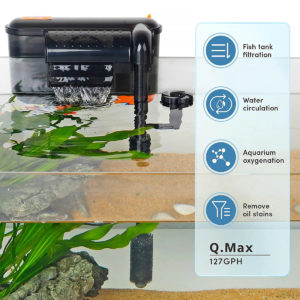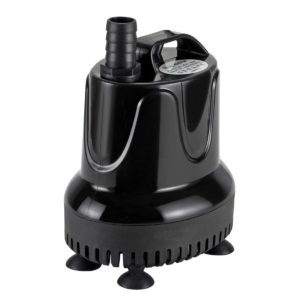How to Treat a Fish with Heavy Breathing
Have you ever noticed that your little fish sometimes may suffer heavy breathing? And do you know how to deal with it? Do not hurry! In this article, we will cover the signs, causes, and great solutions to breathing heavily.
Content Table
What are the signs of a labored breathing fish?
Before having a deeper understanding of heavy breathing, let’s get started with the signs of labored breathing.
| Signs | Detail info |
| Lethargy | Fish may not be as active as usual, they prefer to stay at the bottom of your aquarium, rather than swim and explore around the tank. Some even jump out of the water and wait for death. |
| Lack of appetite | Fish do not eat anything or eat less. They possess little interest in food. |
| Gills | The gills become reddish. |
| Moving times of gills per minute | Over 80 times per minute |
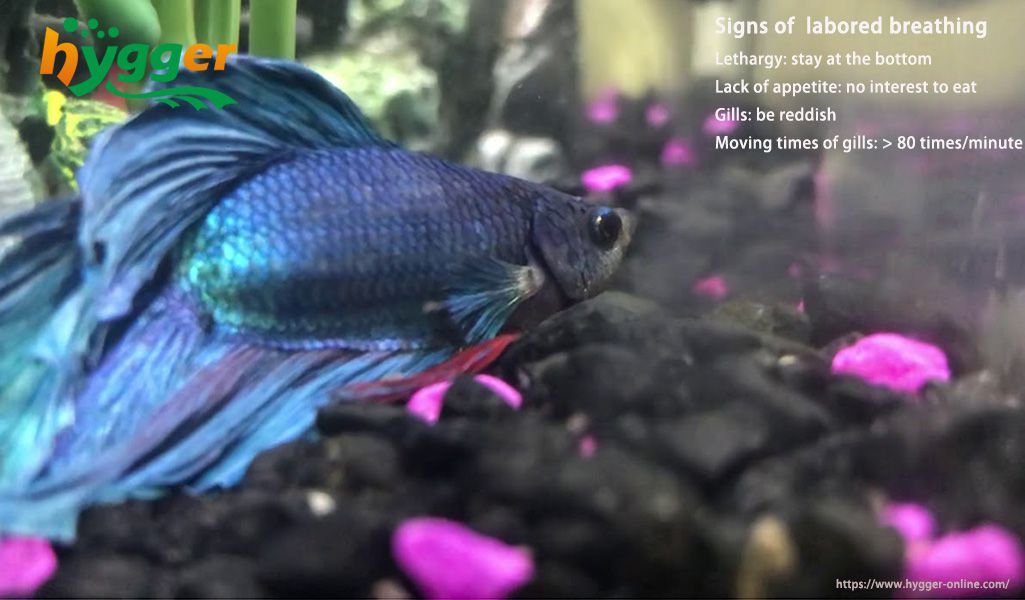
Why is my fish breathing heavily?
Just as the saying goes, everything happens for a reason. In this segment, we will discuss the causes of breathing heavily.
1. Lack of oxygen
If there is a low oxygen level in your tank, fish will swim to the surface of the tank and take in the oxygen on the surface. Their gills can decompose the dissolved oxygen, however, the aquatic plants will consume oxygen at night, and as a result, there will be low oxygen but higher carbon dioxide at night. Without plenty of oxygen, the fish can not survive. Once you notice, you should take action as soon as possible. By the way, the main causes of lack of oxygen include elevated water temperature, overstock, and lack of water movement. Overstock can also cause stunted growth or other illness.
2. Ammonia or nitrates
You should keep the levels of ammonia and nitrates at zero, or the water in your tank will get polluted, which is fatal for your fish. The uneaten food and decayed plants will produce ammonia. Moreover, more fish means more feces and wastes, which accelerates the accumulation of ammonia and nitrates. Ammonia will corrode fish’s gills, then affect fish’s breathing. Besides that, ammonia also prevents oxygen in the blood from cycling in internal tissues and organs. Your fish may suffer ammonia poisoning if you do not change the water or clean your tank for a long time.
3. Stress
Some aggressive fish may bring stress to other fish in your tank, which may lead to heavy breathing. Then they will keep far away from the aggressive ones, and hide behind the ornaments, aquatic plants, or other rooms that they can hide. Aside from that, the temperature shock also causes stress to fish. Your fish can not adapt to the sudden change and will breathe heavily. In addition to this, when you change the water in the tank or inappropriately move the fish, your fish will also feel stressed.
Nonetheless, stress will affect the immune system, and then your fish will suffer heavily.
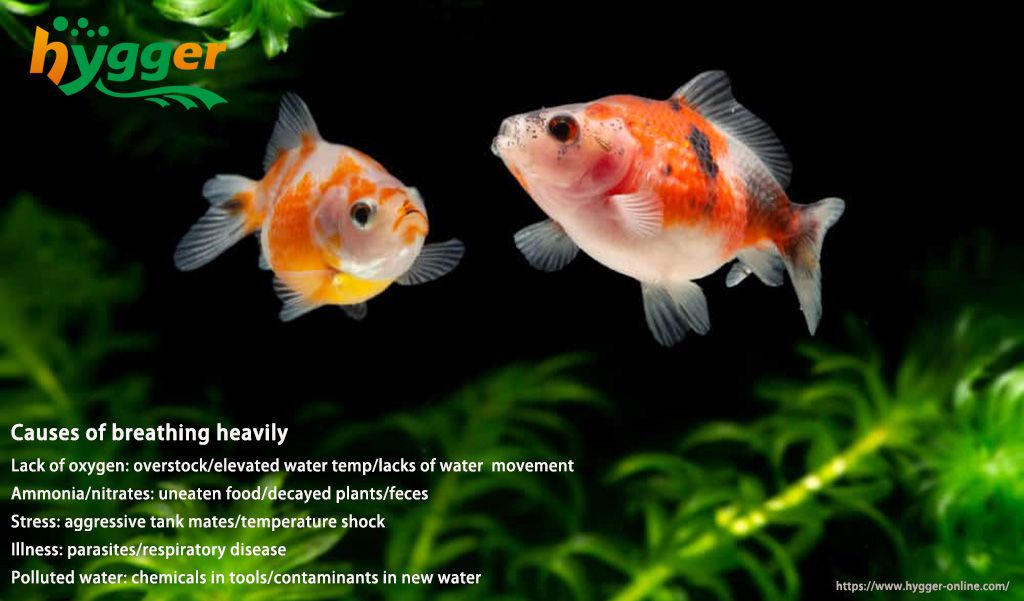
4. Illness
Some parasites can invade the fish’s gills directly, then your fish may suffer death due to gills being essential for the breathing system of fish. Furthermore, respiratory disease, including ich, velvet, columnaris, and tumors, also leads to heavy breathing. By the way, if your fish suffer from these diseases, it is recommended to take them to see a veterinarian.
5. Polluted water
When you change the water in the tank or add new water to tanks, some tools are needed, a bucket, a cup for instance. If there are some chemicals in the tools, soap, for example, the gills of your fish will corrode, and finally, lead to heavy breathing. On the other hand, the new water may contain contaminants, such as chloramine. It will pose a threat to your fish. By the way, if you want to know more about water sources, you can go for Aquarium Water Sources – The Best Water for Aquarium.
How to prevent fish from heavy breathing?
At present, you have known the causes of heavy breathing, so how can we avoid it? In this part, we will give you ideas to deal with the problem.
1. Improve the oxygen level in your tank
Applying an aquarium water pump is feasible. It can circulate the water, increase the water flow, and then improve dissolved oxygen levels. Moreover, an air stone is another excellent choice. You can place them on the bottom of the tank, and it can create bubbles, and then dissolve the oxygen in your tank.
2. Improve water quality
Be sure to clean the fish tank and change the water regularly. And do not overfeed or overstock your fish. Since the uneaten food may be decomposed to toxic debris and waste may contain toxic substances. In addition, testing the water parameters in your tank is also necessary, including the levels of ammonia, nitrates, and nitrites. Meanwhile, it is equally important to check the water parameters of new water before adding them to your aquarium. Adding a waterfall filter is a great option, which can help to keep the water clean. As it can agitate the water surface, while also providing filtration.
3. Isolate your fish
If there are extremely aggressive fish in your tank, it is better to separate them from another fish tank, or s. Also, when you notice injured or ill fish, you should isolate them as soon as possible and then observe them. By doing so, you can avoid infecting other fish.
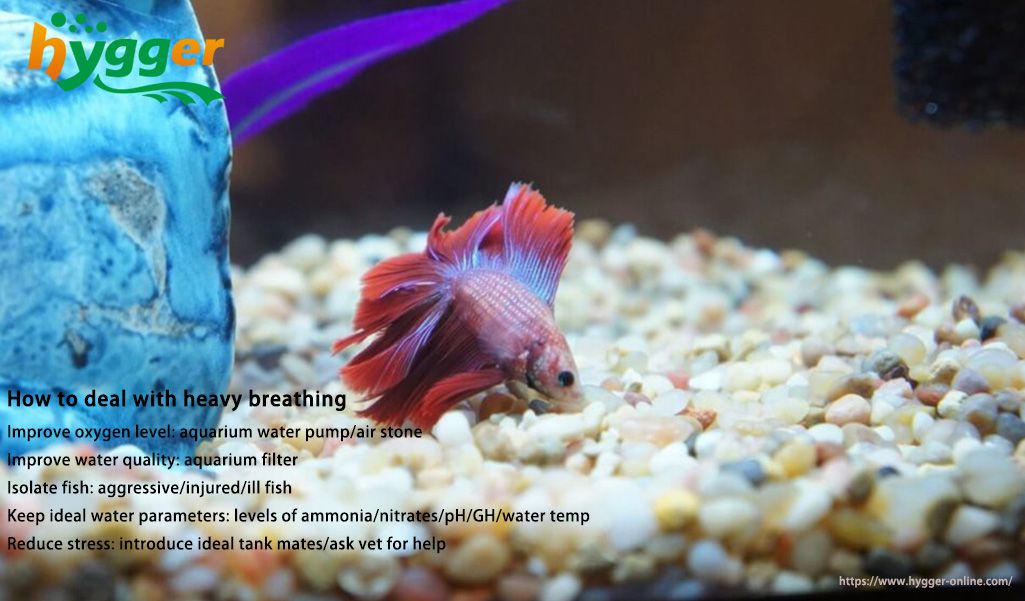
4. Keep ideal water parameters
You should keep in mind that the levels of ammonia and nitrates should be kept at zero. The temperature, pH, and GH levels vary for different fish species. But you can apply a fish tank water heater to keep the water temperature stable. Meanwhile, to check the real-time water temp, adding a thermometer is also important.
5. Reduce stress
If your fish suffers diseases, it is best to ask an aquatic veterinarian for help. Aside from that, you can reduce stress for fish by avoiding the following actions:
- Relocate your fish to a new tank.
- Too many aggressive fish/inappropriate tank mates
Reminder
In summary, you can deal with heavy breathing following the solutions during daily maintenance.
| Causes of breathing heavily | Solutions |
| Lack of oxygen |
|
| Ammonia or nitrates |
|
| Stress |
|
| Polluted water |
|
After reading, we hope you can handle the heavy breathing and enjoy keeping your cute fish! And thanks for your reading!


